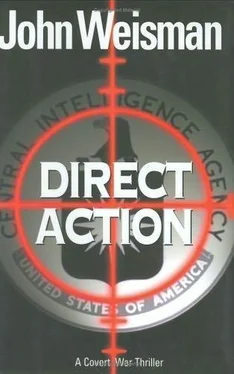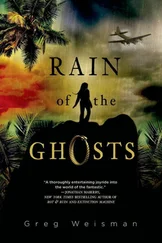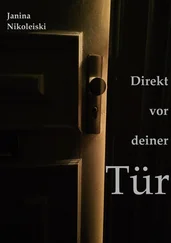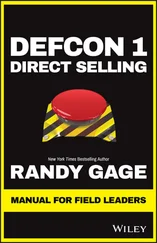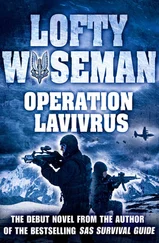Reuven turned north. Tom looked up. The highway was bordered by cypress groves. About three-quarters of a kilometer north of the intersection, Reuven turned onto an unmarked gravel road bulldozed into the wall of trees. He headed west, toward the sea. For the first half kilometer, the road ascended. Then it crested and dipped. As they descended, the tree line opened slightly and Tom saw an old British fort in the distance. It was a squat, square three-story affair built of thick Jerusalem stone, with crenellated watchtowers that looked like old-fashioned chess pieces at each corner.
Reuven pulled up at a rudimentary roadblock manned by half a dozen troops armed with M-16s. Tom glanced into the woods and was surprised to see four olive-drab Jeeps with pintle-mounted.50-caliber machine guns and three camouflaged APCs close at hand. He waited while Reuven palavered with the guards, then watched as a soldier pulled a twenty-foot length of tire spikes out of the way so they could proceed.
The heavy weapons had gotten Tom’s attention, and he scanned carefully as they drove the last half klik to the old fort. In the sixty seconds it took them to do so, he identified five layers of defensive countermeasures: raked cordons sanitaires, surveillance cameras, infrared sensors, K-9 teams, and razor wire. He wondered what he’d missed.
As they pulled onto the small parking lot Reuven turned to him, his face serious. “Listen carefully. This place does not exist. So far as I know, you’re the first foreigner ever allowed inside. Point of fact, Tom, I was surprised when they said yes. So treat what you see and hear here accordingly, okay?”
Tom’s expression showed that he understood the gravity of what he was being told. “Got it, Reuven. And thank you.”
10:12A.M. In a sterile, windowless interrogation room holding a metal desk and two metal chairs bolted to the concrete floor, he stripped down to his underwear and was given a set of utilitarian olive-drab coveralls and a pair of scuffed black leather boots that looked about half a size too small. He’d even had to hand over his watch, which along with his other personal belongings were sealed into a heavy brown envelope then taken away to be stored in a safe in the commandant’s office. The only thing he carried was the handkerchief he’d transferred from his trouser pocket.
When he’d asked why he couldn’t keep the watch, he was told the prisoners were allowed no sense of time. It was an integral part of the interrogation process. The cells were lit by artificial light, which could be regulated to disorient and throw their biometric schedules and thinking processes into chaos. Some “days” were eight hours in length; others might last thirty-six.
“We do not use physical abuse,” the officer in charge of his visit explained. He was a diminutive man who looked to be in his mid- to late sixties and who spoke to Tom in Kurdish-accented Arabic. The left arm of his olive-drab coveralls was folded neatly and attached by the cuff just below the epaulet. From what Tom could make out, the man’s whole left arm had been taken off at the shoulder.
The Israeli introduced himself as Salah and volunteered no further information as to his rank or position. When Tom asked how the prisoners were treated, Salah cocked his head defensively. “There are no stress positions, hooding, or coercion used here.”
“Why not? That’s how our detainees in Afghanistan and Iraq are being treated.”
“Of course.” Salah rubbed his pencil-thin mustache with the edge of his right hand. “They are effective techniques in the acquiring of actionable intelligence. Quick results for immediate needs. A slap in the face, a threat, the pit-of-stomach claustrophobia from being hooded sometimes works to jar loose information about an imminent operation. That’s fear, my friend. You can extract information by using fear-I believe you Americans teach a technique at Fort Huachuca called ‘fear up/fear down.’ But fear is short-lived. I prefer dread. Day-in, day-out, marrow-of-the-bone angst is what I want to produce. Our prisoners know we have a reputation for ruthlessness. It doesn’t matter whether that reputation is true or not. What matters is the psychological effect it has on them. Let me tell you something, my friend: dread works. Dread works very well.”
Tom remembered how he’d felt when they’d come through the gates. The unpleasant sensations that had been prodded by what he’d smelled. “Including sensory exploitation, right?”
A sly smile crossed Salah’s face. “How do you mean?”
“What I smelled when we came into the facility. It made me react viscerally.”
“Ah, le parfum pénitentiaire . It took us months to develop. What did you think?”
“I was impressed. It made me extremely…apprehensive.”
“You felt dread, correct?”
“Precisely.”
“That’s why it works. Look-I throw into a cell a man. He’s no hard-liner, but let’s say he was standing close by when two Israeli reservists are attacked, beaten, then thrown out of the second-story window of a Palestinian Authority police station, then stomped to death by the crowd the Palestinian police have assembled below. There is video-a Western camera crew was rolling during the incident, so we have lots of faces but no names. This guy, we think he has names.”
“Why?”
“Because in the video he’s a part of the crowd. He looks like he knows the people around him-the same animals who tore our soldiers apart limb from limb and then turned to the camera to show off their bloody hands. Either they’re his neighbors or he’s a part of one of the murderers’ extended families. I have to fracture that clan loyalty and get him to name names before Arafat ships the scum with the blood on their hands out to Gaza or Egypt or Syria, where it’s harder for us to lay our hands on them. So Shabak noses around until they find him, scoop him up, and bring him to me. Not here. To another place. Things are abrupt, quick. He has no time to think or react. He’s yanked into a truck, and the next thing he knows he’s smelling what you smelled-and all of a sudden he is afraid. He is very, very afraid. Then he loses his clothes. He’s handed dirty, anonymous over-alls that smell of someone else’s sweat and urine. He’s alone. He’s frightened. He’s been separated from his family, his village, all his friends. He’s pushed into a cell. A very spartan cell. Then I start the disorientation and, more important, the anticipation of dread. A few slaps in the face- whapwhap . A cuff or two on the back of the head- smack-smack . Then he’s left alone to wonder what’s coming next. Then I use heat. Followed by cold. Then sleep deprivation. During this time, he’s hooded for what he thinks is a day, maybe even two.”
“How does he know?”
“Because we designed the hoods so he can see just enough to know when the lights go on and when they go off. Because he can hear the other prisoners being served breakfast or dinner.” Salah’s eyes narrowed. “His senses tell him what’s what.”
“And how long are we really talking about?”
“Nine to thirteen hours tops. Sometimes much less.”
Tom pursed his lips. Impressive.
Salah continued. “He can hear things but not see anything. He hears someone being taken away. He hears screams-I mean serious. Like fingernails being pulled out, or hot irons burning flesh or electroshock. Sometime later-he has no idea how long-he hears the sound of a body being dragged down the corridor and thrown into the adjacent cell. If he listens very carefully, he can make out excruciating moans. It may all be role-playing or sound effects coming from a compact disc and a very sophisticated speaker system-sophisticated enough to make the walls of his cell rumble if we have to. But my target doesn’t know that. All he knows is what his buddies have told him and what he’s picked up on the street about how ruthless we are-and what he’s just gone through. Believe me, by the time I ask him the first question, he is already putty.”
Читать дальше
